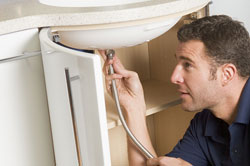Since people will always need the aid of plumbing services, the job prospects in this field are more than excellent. However, individuals interested in making a career in plumbing and increase their chances of being their own boss or advancing in the hierarchies should seriously consider qualifying in one of the various specializations in the industry. Truth be told, learning one of the specializations is not going to be easy and it will take some time. On the other hand, nothing is impossible with the right training and there is a great future for specialized plumbers who have learned the special methods and techniques of the job.
A word on the available plumbing specializations
After finishing apprenticeship, the professionals will earn the title of general plumber. Typically, the general plumber is a self-employed contractor that operates and performs maintenance in fixtures, appliances and pipes in residential and commercial buildings. It is worth mentioning that the services of general plumbers can vary from state to state and always take into account the legislation and the regional codes.
Another viable option for a plumber that has finished his apprenticeship would be to specialize, especially given the jobs in plumbing qualifications market. However, learning a specialization in plumbing often involves following the courses of a vocational school or receiving formal training via a community college. In addition to the classroom studies, some states require specialized plumbers to continue apprenticeships so they can put into action the techniques and use the tools related to the plumbing industry. Some of the specializations plumbers can learn include:
- Sprinklerfitters
- Steamfitters
- Pipelayers
- Pipefitters
What does a pipelayer do?
Pipelaying is a specialization especially useful on construction sites, since the best time to install the tubes for various purposes is while a building is under construction. The expertise of a pipelayer is usually required at the beginning of every construction, as this professional ensures that all requirements are met regarding depth, drainage and overall safety. As the name of the specialization suggests, the other job duties of this professional is to arrange the pipes in the correct position according to the blueprints and join them together to prevent leakages. After the pipeline system is complete, the pipelayer can use various materials to cover them and make sure they do not cause an obstacle.
The responsibilities and duties of a pipefitter
Another category of jobs in plumbing qualifications that has great perspectives is pipefitting. The role of this professional is to install and perform maintenance on low and high pressure pipes typically installed in commercial facilities, such as power plants, factories or any building that needs industrial heating and AC systems. The advantage of selecting this specialization is that it offers a certain degree of freedom that other types of specialized plumbers do not usually get. For instance, a self-employed pipefitter can make decisions regarding goals and set a deadline for the project.
The extra training that these professionals need is very clear once the difference between plumbers and pipefitters is clarified. In essence, while the pipefitters take on large projects, like working on a city’s water supply, the plumber does the same but on a smaller scale, such as a building. As it is noticeable, the tools, materials and expertise required to finish the project are very different.

- Home
- Jobs In Plumbing Information
- Entry Level Plumbing Jobs
- How To Bid A Plumbing Job
- Job Search Plumbing
- Jobs In Plumbing Qualifications
- Plumber Job Openings
- Plumbing Contract Work
- Plumbing Employment Agencies
- Plumbing Job Description
- Plumbing Jobs Agencies
- Plumbing Jobs Rates
- Plumbing Jobs Recruitment
- Plumbing Jobs Training
- Plumbing Jobs Websites
- Jobs In Plumbing USA
- Types Of Jobs In Plumbing
